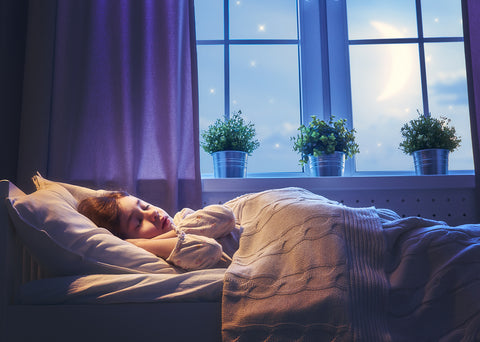Sleep — it's something we all know we need. Unfortunately, most of us don't get enough. Unfortunately, lack of sleep has been linked to a host of health problems, including everything from irritability to higher rates of heart disease.
If you have trouble falling asleep, or you don't get high quality sleep at night, a weighted blanket may help you banish insomnia and enjoy more restorative sleep. Here’s a look at why sleep is so important for good health, and how making a few basic changes can help you get a better night’s rest.
How Sleep Disorders Affect Your Health

Insomnia is much more than an inconvenience. When it’s persistent and ongoing, it can lead to potentially serious health problems. The most common of all sleep disorders, it affects about 40 million people in the United States. The National Sleep Foundation (NSF) characterizes insomnia as difficulty falling asleep, staying asleep or returning to sleep. Insomnia that occurs at least three nights a week for a minimum of three months or more is considered chronic insomnia, which can wreak havoc on a person’s health.
As you might expect, shift workers — nurses, doctors, truck drivers and factory workers — have higher rates of insomnia compared to people who work regular 9-to-5 jobs. However, insomnia can strike just about anyone regardless of their work schedule or daily habits. If you’ve ever struggled with insomnia, you know how disruptive it can be. Common side effects of insomnia include lack of energy, anxiety, irritability and pervasive drowsiness.
Studies have also linked insomnia with a higher risk of car accidents and occupational injury. According to the NSF, research shows that staying awake for 18 consecutive hours has the same impact on your body as driving with a blood alcohol level of .05 percent. Staying awake for 24 hours straight is comparable to driving with a blood alcohol level of .10 percent — well over the legal limit of .08 percent.
In the workplace, sleep disorders like insomnia lead to a sharp increase in accidents. According to the Sleep Center of Greater Pittsburgh, “highly fatigued workers are 70 percent more likely to be involved in accidents” and “those who report disturbed sleep are nearly twice as likely to die in a work-related accident.”
How Much Sleep Do You Need?
Many people are surprised to learn they’re not getting the proper amount of sleep each night. While individual sleep needs vary, the NSF recommends general sleep guidelines for every age group.
- Older adults (65+) - 7 to 8 hours
- Adults (26-64) - 7 to 9 hours
- Young Adults (18-25) - 7 to 9 hours
- Teenager (14-17) - 8 to 10 hours
- School Age (6-13) - 9 to 11 hours
- Preschool (3-5) - 10 to 13 hours
- Toddler (1-2) - 11 to 14 hours
- Infant (4-11 months) - 12 to 15 hours
- Newborn (0-3 months) - 14 to 17 hours
In addition to getting the right amount of sleep, it’s also important to create an environment that promotes good sleep quality. A big part of maintaining a successful sleep environment is practicing good “sleep hygiene” whenever possible.
5 Ways to Improve Your Sleep Hygiene

According to Harvard Medical School, good sleep hygiene can include any practice or habit that helps you maximize the time you spend sleeping. You can spend hours in bed, but if your sleep environment isn’t conducive to restful sleep, you’ll end up wasting time — and an opportunity to get the restorative sleep your body needs. Here are five tips for improving your sleep hygiene and creating an ideal sleep environment.
Make Your Bedroom a Sleep Haven
Is your bedroom an inviting oasis, or does it resemble Grand Central Station, with piles of clothing, toys and other odds and ends of daily life? For many people — especially parents — a master bedroom ends up being something of a common room where you fold clothes, watch television and work on projects outside of the office.
Sleep experts say this can set you up to fail when it comes to getting the sleep you need. Far from being a multitasking space, your bedroom should be a place where you go to relax, unwind and rest.
To transform your bedroom into a haven for sleep, start by decluttering. Clear out the laundry, toys, books and other items. From there, select bedding, lighting and colors that promote rest. Even something as simple as your lightbulbs can impact your sleep. According to sleep researchers, red light is actually best for sleep, as the photosensitive cells in the human eye are least sensitive to the red wavelength. These cells are most sensitive to blue light, which is why the blue-tinted glare of a TV or computer screen is so disruptive to sleep.
Sleep experts say you should also keep the temperature between 60 and 67 degrees, as the body naturally cools down at night. For better sleep, researchers say to “think of your bedroom as a cave — it should be quiet, cool and dark for the best chance at getting enough rest.”
Limit Caffeine Intake
Statistics reveal that caffeine is about as American as apple pie. About 80 percent of the population consumes caffeine every day, according to Dr. Michael J. Breus, The Sleep Doctor. While caffeine can provide a short-term stimulus that actually improves alertness, overconsumption has the opposite effect.
Dr. Breus explains that caffeine suppresses the production of melatonin, the neurotransmitter responsible for regulating sleep. “It might surprise you to hear, but caffeine has an even stronger influence on melatonin suppression than bright light.” This means that your evening soda, tea or coffee could be impacting your sleep more than late-night TV or a long after-hours work session.
So how much caffeine is too much? The Food and Drug Administration recommends limiting yourself to 400 mg each day. If you have a heart condition or other health concerns, your doctor might recommend less (or none at all).
Establish a Soothing Bedtime Routine
If you conk out each day in front of the television, or you fall asleep in bed with your phone in hand, you’re probably not using the best sleep hygiene possible. Just as a soothing bath and bedtime story can work wonders when it comes to getting children to bed on time, a regular bedtime routine can help adults, too.
Ethan Green, the founder of No Sleepless Nights, recommends a bedtime routine for combating insomnia. Tips include light reading (sleep experts recommend avoiding backlit devices), meditation, listening to relaxing music and making a to-do list to help clear your mind of worries and tasks for the following day.
Eliminate Screen Time

Sleep expert Dr. Charles Czeisler says smartphones and similar devices are notorious “sleep stealers.” When you recharge in bed, he says your phone should be downstairs (or in another room) doing its own — separate — recharging. “People will say, ‘I wake up, go to the bathroom, and check my phone.’ That’s a disaster from the get-go. Before you know it, you send out a couple of tweets, and it’s the morning. It’s very disturbing. That’s why the electronics should really not be in the bedroom.”
In addition to charging your phone and tablet somewhere besides the bedroom, you should also be mindful of how much time you spend on it before bed. A whopping 95 percent of people use some sort of electronic device within an hour of bed — something that can make it difficult to fall asleep and stay asleep.
Try Deep Pressure Touch Stimulation
Relaxation techniques like massage, meditation and yoga have been shown to promote better quality sleep. As Kray Kibler states in Sleep Review, the journal for sleep specialists, “The chemistry of sleep is relevant in relation to massage because it directly influences the body’s production of serotonin, which is essential for the production of melatonin.” Deep massage, which uses slower, more forceful strokes to target the deepest muscles, is especially useful for inducing healthy sleep.
With a weighted blanket, you can continue the benefits of deep pressure touch stimulation throughout the night. Research published by the American Academy of Pediatrics reveals that weighted blankets may help children with autism spectrum disorder sleep better. In a 2004 study, weighted blankets reduced nighttime cortisol (the stress hormone) levels in adults with sleep disorders, stress and pain.
Ease Insomnia with a Weighted Blanket
Would you like to experience better quality, more restful sleep? If you struggle with insomnia, a weighted blanket may help you fall asleep faster and stay asleep throughout the night. Order your weighted blanket today. You can also get in touch by calling us at 855-736-7222 or using our online contact form.
Have you kicked insomnia to the curb? Share your sleep tips by tweeting us @SensaCalm.
Disclaimer: The content on this website is not intended as a substitute for medical advice. Talk to your doctor or healthcare provider before undertaking any type of therapy or treatment.


